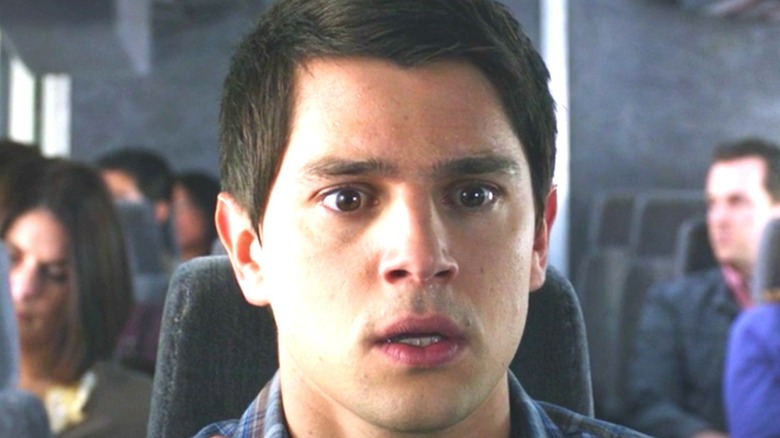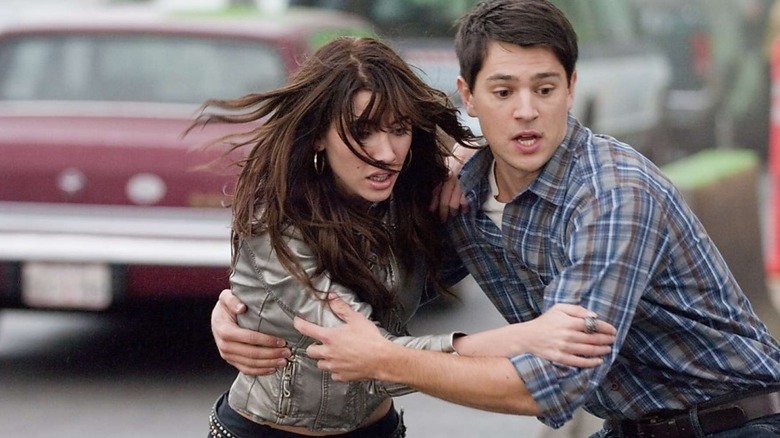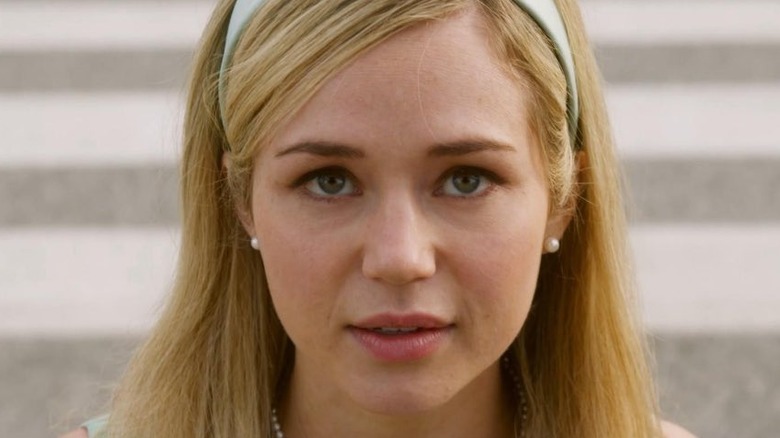The Ending Of Final Destination 5 Finally Explained
Horror movies are filled with all kinds of monsters. From swamp things to werewolves to apparitions, there's no shortage of things that go bump in the night. But one film series has made an antagonist out of the scariest boogeyman of them all — the very concept of death itself.
The "Final Destination" series maintains a simple premise. One person sees a premonition of an impending disaster. They're able to avert said disaster along with a group of friends/acquaintances, and as we've heard far too many times before, death doesn't like to be cheated out of a life. One by one, the characters meet gruesome ends, often as a result of some convoluted Rube Goldberg-type machinations, because death always comes to collect.
For a long time, the peak of the franchise came with the 2011 installment, "Final Destination 5." It had some of the bloodiest deaths seen in the film series, and until 2025, served as a worthwhile finale that tied the entie saga together. Here's what you need to understand about the ending of "Final Destination 5" — and why it provided the key to continue the series 14 years later.
Final Destination 5 ends where the first film began
After experiencing an immeasurable amount of blood and death in "Final Destination 5," everything seems to be looking up for Sam (Nicholas D'Agosto) and Molly (Emma Bell). With their relationship going through some serious back-and-forth throughout the movie, Sam decides it's finally time for them to travel to Paris for that cooking apprenticeship he so desperately wants. But sadly, it doesn't seem like Paris is in the cards.
As the two board their flight, they see a couple arguing at the front. Fans of the franchise will undoubtedly recognize them as Alex Browning (Devon Sawa) and Carter Horton (Kerr Smith) from the original "Final Destination." In that film, Alex has the premonition that the plane will explode in mid-air. Sam and Molly aren't lucky this time around, as they remain on the plane when it takes off. Of course, Sam doesn't realize what's happening until it's too late, and the two doomed lovers try to survive — to no avail — one last time as the plane goes down.
Unbeknownst to viewers until that moment, the ending of "Final Destination 5" turns it into a surprise prequel for 2000's "Final Destination," providing a nice bit of symmetry to the series as a whole. It's oddly appropriate for a franchise where people die in wildly unexpected ways to have a similarly unexpected twist. And it helped set the stage for the eventual "Final Destination: Bloodlines."
Final Destination 5 helped inspire the 1960s aspects of Final Destination Bloodlines
"Final Destination Bloodlines" is much more transparent about going back to the past. The film opens in the 1960s, as a young Iris Campbell (Brec Bassinger) arrives with her boyfriend at the new Skyview restaurant. But Iris's premonition saves hundreds of people as the restaurant collapses. That, however, causes a ripple effect where Death goes after everyone who was supposed to die that evening as well as their descendants, who shouldn't exist in the first place.
The creative team was encouraged to push this ambitious idea forward and break the boundaries of time thanks to "Final Destination 5." "By bringing in the idea of starting in the '60s and jumping forward 50 years, I think has liberated us creatively to be able to go to a lot of different places in time and to make connections that we wouldn't have been able to do otherwise," producer Craig Perry told Deadline. One audacious connection that could exist is that the averted Skyview disaster is what links all of the "Final Destination" movies together. This is suggested at one point in "Bloodlines" where a timeline of all the delayed Skyview deaths includes a Post-It note with "2000" written on it, which is also the year the first "Final Destination" film came out.
This suggests the plane explosion, and every other opening set piece of a "Final Destination" movie, took out someone who was supposed to die at Skyview (or one of their descendants). In that way, "Bloodlines" owes a debt to the time-traveling "Final Destination 5" ending, and leaves the door open for more inventive plotlines going forward.


